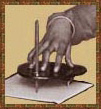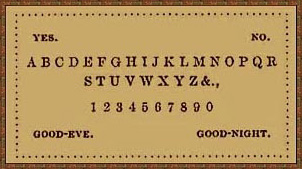Quji Boards- also known as the talking board or spirit board, is a flat board marked with numbers and words such as yes and no. The origin of Quji boards derived long ago in the mid 1800's. In Hydesville the birth of mediums were born where two sisters Kate and Margaret Fox claimed to be in contact with the dead. Medium or Mediumship is the practice of speaking or contacting the angle, dead, spirits, or entities through seances. Kate and Margaret's discovery of channeling with the dead bloomed throughout Europe and United States. Since then mediums became popular for people wished to communicate with ones who has passed. One method that was widely used then for communicating with the dead was table turning. The medium would sit at the end of the table along with others joining fingers and would wait for the spiritual world to contact them. The table would tilt and wobble thus cause letters to fall which then becomes a form of communicating with the spirit. The letters would spell out answers to their questions.
Attenders would find this method too time consuming, therefore other mediums designed improved devices that would be less noisy and time staking. After table turning then came along the Planchette. The planchette was designed by a French medium named M. Planchette. A planchette, based from wikipedia is a heart shape flat piece of wood that moves on a piece of board to spell out messages. The planchette we know now is similar to what wikipedia described, but the early planchette contained a pencil attached to the center of the device. Planchette's Quji boards uses today has a plastic piece in the center which identifies the letter it points to. That center piece replaced the pencil because it was too hard to keep the pencil still while communicating with the spirit.
Over decades this "game" has been passed on from culture to culture. Quji boards as I described earlier bloomed in the mid 1800's in Europe and United States. However, in other cultures such as the Chinese, Quji boards was widely used in the 1100 BC. The Chinese called it fuji, also known as planchette writing. Fuji was popular in the Song Dynasty where the Chinese would use a stick placed in a craddle of sand, prayed to the spirit in which they want to contact and began their communication with the dead. This method was soon banned in the Qing dynasty, however is still widely known and used today.
Now that the brief description and history of the Quji Board has been told, there are some stories I want to share with you. After the story is told it is your choice in believing or disbelieving....

A friend of mine and a few of his friends were playing with the Quji Board one Sunday evening. The game was entertaining said's he and for that reason he wanted to play again, but this time alone. His friends were sitting at the corner of his bed while he settled himself on the table by the window. He placed his hands on the planchette and for the first few minutes he repeatedly asked for the spirits name, but there was no reply. Almost five miutes has passed and he was about to dismiss the game all of the sudden the planchette began to move. He was thrill more so than spooked. He asked for the spirits name, but the planchette could not rest onto a single letter. but just kept shifting from one letter and number to another. He asked if the spirit was at the presence of his room and it replied yes. He asked since you are unable to tell me your name is it possible that you may show me a sign of your presence. You may knock, whisper, or create a scene. The planchette stopped moving. And for a minute he stood still anticipating for a sign. There was no sign, therefore he was at the verge from removing his hands from the planchette. All of a sudden he felt a touch which skinned acrossed his hands that was still placed on the planchette. He felt a breeze to the right of his ear. As shocked and surprised he was he did not let go of the planchette. His friends saw the astonished look he glowed and inquired of what had happen. He ignored their questions and asked for the spirit if it is okay that he may let go of the planchette, for that is one of the rule of thumb when playing with the Quji board. The planchette slid off the board and the game had finally ended. He then told his friends of what had happened, and of course many disbelieved him.
A number of my highschool friends gathered one night in playing with the Quji board. My friend lived by the beach in the Sunset district of San Francisco. I was told that there was at least eight people attending the game. So all proceed by placing their hands on top of the planchette. I can argue that this was sure coincidence, but as soon as one of them asked for the name of the spirit the nights went out in the room. Everyone was shocked, scared, and amazed of what just had happened. The lights in my friend's room does not consist of any switch. She had those light where it is only activated when you clap. I was told that during the game no one had clapped. It was only silence that kept them company. So the question is how would the lights go off if no noise or clap was made. Brave soilders they were they continued the game despite of what had happened. They asked several questions such as facts about her birth place, etc..and all answers were accurate. You can argue that somone might have been pushing the planchette, but the lights going out is questionable.
Rather then providing stories of my own here are clips of other known encounters of the Quji.
Final note, there are several rule of thumbs when playing with the Quji board.
1. When you are in contact with the spirit, before you ask any questions, remember to ask if the spirit likes the sun or the moon. If it likes the sun you are in good shape. If it likes the moon, try not to play, for I have heard that if it likes the moon...it could be evil and it would not allow you to end the game.
2. Never abruptly remove your hands from the planchette, always ask to be excused.
3. When you end the session/game always wait until the planchette slides off the board before you may remove your hands.
4. Do not make the spirit angry.

No comments:
Post a Comment